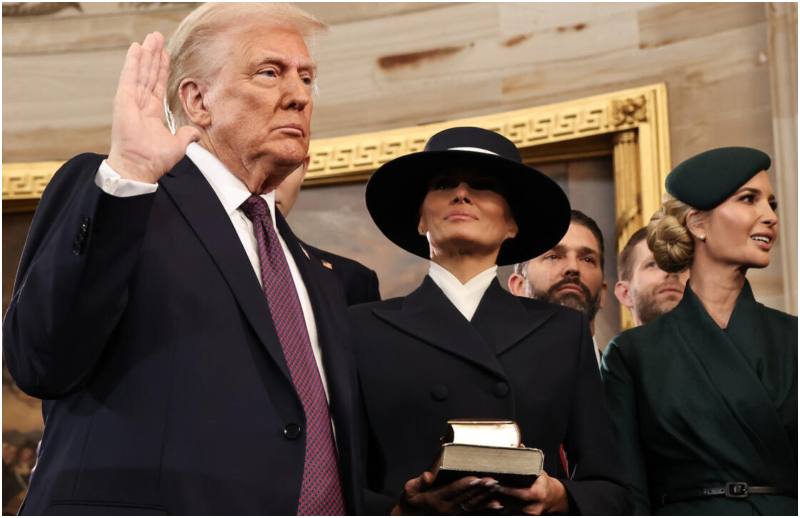The intersection of criminal convictions and the presidency has become a focal point of legal debates following Donald Trump’s felony convictions and subsequent assumption of the presidency.
This unprecedented situation raises critical questions about constitutional law, the separation of powers, and the resilience of democratic institutions in the United States.
Donald Trump’s felony convictions stem from charges related to obstruction of justice, campaign finance violations, and classified documents mishandling. Despite these legal battles, Trump’s 2024 presidential campaign resulted in his election victory, reigniting discussions about whether a convicted felon can serve as President of the United States.
Constitutional Framework: Can a Convicted Felon Be President?
The U.S. Constitution sets out the qualifications for the presidency in Article II, Section 1. A candidate must:
- Be a natural-born citizen;
- Be at least 35 years old; and
- Have been a resident of the United States for 14 years.
Notably, the Constitution does not disqualify individuals with felony convictions from holding the presidency. This silence has allowed Trump’s legal team to argue that his convictions do not preclude him from assuming office.
Legal scholars have pointed out that this omission likely reflects the framers’ intent to leave disqualification decisions to voters and the impeachment process rather than criminal courts.
The 14th Amendment Debate
However, Section 3 of the 14th Amendment adds complexity to this issue. Known as the “Disqualification Clause,” it bars individuals who have engaged in “insurrection or rebellion” against the United States from holding public office.
Critics of Trump argue that his role in the January 6 Capitol attack constitutes insurrection, thereby triggering this clause. This argument is currently the subject of ongoing litigation in multiple jurisdictions.
Pardons and Presidential Powers
Another source of controversy concerns the presidential pardon power. Article II, Section 2 of the Constitution grants the President the authority to issue pardons for federal offenses.
Legal experts are divided over whether Trump, as a sitting president, could pardon himself. While no court has definitively ruled on this matter, the Justice Department’s Office of Legal Counsel (OLC) issued a 1974 memo during the Watergate scandal suggesting that self-pardons are unconstitutional, as no one should be a judge in their own case.
If Trump were to attempt a self-pardon, it would likely result in a landmark Supreme Court case. Alternatively, he could resign temporarily and have his vice president issue the pardon, as some legal theorists have suggested.
Implications for Governance
Trump’s presidency under the cloud of felony convictions presents governance challenges, particularly in areas requiring security clearance and public trust. For example:
- Classified Information: A convicted felon typically loses the right to access classified information. However, as President, Trump could override such restrictions, creating a paradox where the individual responsible for safeguarding national security is also compromised by felony convictions related to classified documents. Additionally, his unconditional discharge in the New York case underscores the legal gray areas—though Trump’s convictions stand, his ability to navigate presidential duties remains legally intact.
- Public Confidence: Critics argue that Trump’s convictions undermine public trust in the presidency, an office historically associated with moral and ethical leadership. Supporters counter that his election reflects the will of the people, which should take precedence over legal controversies.
Potential Congressional Action
Congress could play a significant role in addressing these legal ambiguities. For instance, it could:
- Clarify the 14th Amendment: By passing legislation or constitutional amendments, Congress could define what constitutes “insurrection” and outline procedures for disqualification.
- Restrict Presidential Powers: Laws could be enacted to limit the President’s ability to access classified information or issue self-pardons while under criminal investigation.
- Initiate Impeachment: If Trump’s legal controversies escalate, impeachment remains a constitutional remedy, though its political feasibility depends on the composition of Congress.
Historical Context and Comparisons
The U.S. has faced similar dilemmas in the past, albeit on a smaller scale. For example:
- Eugene V. Debs: In 1920, Debs ran for president from prison after being convicted under the Espionage Act. While his campaign was largely symbolic, it highlighted the tension between criminal law and democratic participation.
- Richard Nixon: Though never convicted, Nixon’s resignation amid the Watergate scandal and subsequent pardon by Gerald Ford raised enduring questions about presidential accountability and the scope of the pardon power.
Global Comparisons
Internationally, other democracies offer contrasting approaches to similar issues. For example:
- Brazil: In 2018, former President Luiz Inácio Lula da Silva was barred from running due to a corruption conviction, though this decision was later overturned.
- Italy: Silvio Berlusconi, a three-time prime minister, faced multiple criminal convictions but retained significant political influence due to legal loopholes and public support.
These examples underscore the need for clear legal frameworks to balance accountability with democratic participation.
Conclusion
The legal controversies surrounding Trump’s felony convictions and assumption of the presidency illuminate the limitations and ambiguities of the U.S. constitutional framework.
As the nation grapples with these unprecedented challenges, the resolution will likely set enduring precedents for the interplay between criminal law, constitutional governance, and democratic ideals.

